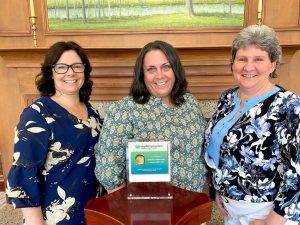
While it’s true that as people grow older, they experience some of the same changes, such as vision loss and decreased flexibility, the aging process can vary greatly from one person to the next. Couples often see this firsthand. One partner might be healthy and active, while the other may have a chronic or life-limiting illness. It can result in the partner who enjoys good health becoming a caregiver for their spouse, sometimes to the detriment of their own well-being.
Older adults who are exploring senior living options for couples often find a Life Plan Community (also known as a Continuing Care Retirement Community), such as Pomperaug Woods, to be an ideal solution. Residents who call one of these communities home benefit from having a full continuum of care available on one campus. It’s a choice that allows couples to remain loving partners instead of weary caregivers.
The Challenge of Caregiving for a Spouse or Partner
It’s a scenario that plays out often. One spouse or partner experiences a significant change in health and the other becomes their primary caregiver. That may be a manageable arrangement in the short-term, such as after a surgery or an accident.
If it’s for a longer period, however, it can cause the family caregiver to develop health issues of their own.
There’s ample evidence to show that caregiving for a loved one can take a physical and emotional toll:
- Develop health issues: Family caregivers are at higher risk for a range of medical conditions –– including depression, migraines, back pain, obesity and diabetes –– than peers who aren’t caregivers.
- Neglect self-care: Spousal caregivers commonly overlook their own well-being. It’s common to see them skipping physician appointments, eating a poor diet and falling behind on important health screenings. Developing unhealthy habits to cope, such as smoking or drinking too much alcohol, are other concerns.
- Experience early mortality: Unfortunately, a spouse or partner over the age of 66 who assumes the caregiver role has a 63% higher mortality rate than their non-caregiving peers.
These are just a few of the reasons why it’s a good idea to get to know more about the senior living options available for couples.
The Advantages of a Senior Living Community
At a community like Pomperaug Woods, senior couples can take advantage of a forward-thinking approach to ensure they have access to the type of living they need now, and the care they may require in the future. If one partner or spouse is in the earliest stages of dementia, a couple might be able to initially reside in independent living. In time, it may be necessary to transition the senior with dementia to memory care. These specialized neighborhoods are secure spaces designed to cater to the unique needs of adults with memory loss.
Another situation that happens among couples who opt to move into a Life Plan Community’s independent living is that one spouse develops a chronic or life-limiting illness. Their condition might require assisted living, skilled nursing or hospice. With a full continuum of on-site care available, the transition can be seamless. The bottom line is that couples benefit when the senior living community offers a variety of levels of care to accommodate changing needs.
Visit Pomperaug Woods for a Personal Tour
The best way to make an informed choice for the future is to visit continuum-of-care communities in person and get to know the residents and staff. Pomperaug Woods is the only not-for-profit LifeCare® senior living community in Southbury, CT. We believe that by sharing experiences, residents find purpose and joy in life, and we invite you to share in that experience.
Contact us today to schedule a time for your personal tour of our senior living options for couples. You’ll see for yourself why J.D. Powers has awarded us top honors in customer service for three years in a row!





